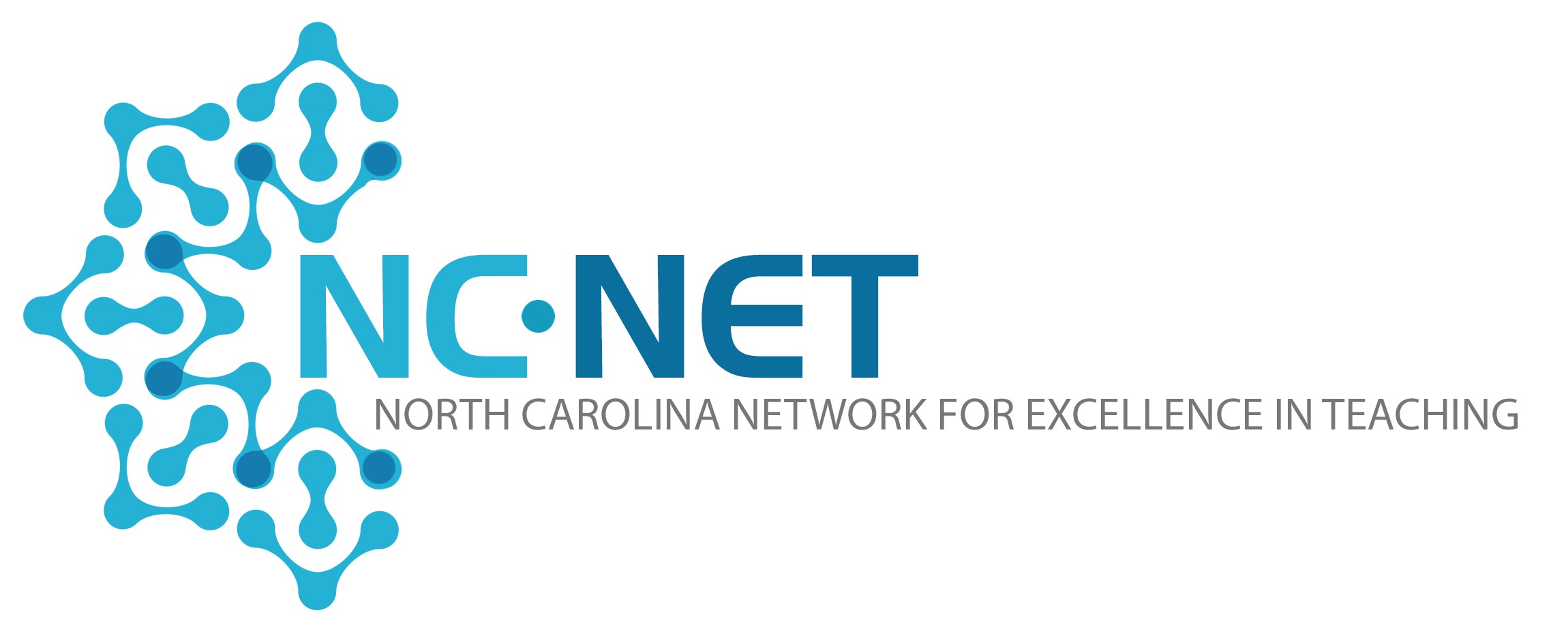Professional Development

NC-NET Academy
Online Professional Development, 2025-2026
Fall 2025
Enrollment through registration request required – please see enrollment dates below.
Facilitated Courses
Start Teaching Today!
New-to-Teaching and Adjunct Instructors Cohort
Includes a Facilitated Capstone Project
August 1 – September 5, 2025
Early Enrollment opens July 14.
Open enrollment begins July 16.
Open Enrollment is now available.
Designed for new faculty with minimal background in education theory and application. Each module provides a guided exploration of resources on topics important to teaching at the college level; helpful links containing examples and implementation tips, expert advice, journal articles, and supporting evidence of best teaching practices. Opportunities for reflection and colleague interaction will be included through discussion board prompts.
Format: A 5-week asynchronous course with weekly objectives and discussions and a facilitated capstone project in Week 5.
Completers earn a completion certificate, a professional development badge, and a stipend.
- What Do I Need for the First Day of Class?
August 1 – 8, 2025 - How Do I Create a Positive Classroom Climate?
August 8 – 15, 2025 - How Can I Enrich the Learning Experience?
August 15 – 22, 2025 - How Do I Know What They Know? Incorporating Authentic Assessment Practices
August 22 – 29, 2025 - CAPSTONE PROJECT: Ready, Set, Go! Next Steps for Instruction
August 29 – September 5, 2025
Active Learning Strategies Revisited: Continuing to Cultivate Critical Thinking
September 5 – October 13, 2025
Early enrollment opens August 18.
Open enrollment begins August 20.
Come explore ways to increase student engagement, participation and critical thinking in your courses. We’ll begin by examining best practices for active learning and critical thinking in the college classroom. Using helpful templates, participants will create two lessons, one showcasing problem-based learning, and one using case-based learning methods.
Format: This is a 5-week facilitated course with weekly objectives and discussions.
Completers earn a completion certificate, a professional development badge, and a stipend.
Habits of Happy Teachers: Perspectives on Thriving in Education
October 10 – November 17, 2025
Early enrollment opens September 22.
Open enrollment begins September 24.
Teaching has always been a demanding field, requiring intellectual curiosity, creativity, and stamina. The post-Covid classroom environment has continued to challenge faculty and students in a multitude of ways. Excitement and motivation for teaching and learning is still in recovery mode. This course provides opportunities for reflecting on our experiences, drawing inspiration from our colleagues, exploring habits that promote wellness, and regaining our “spark.” You will come away with fresh perspectives on educator social-emotional support, stress management, motivation, supportive relationships, successful habits, and much more!
Format: This is a 5-week facilitated course with weekly objectives and discussions.
Completers earn a completion certificate, a professional development badge, and a stipend.
Spring 2026
Enrollment through registration request required – please see enrollment dates below.
Facilitated Courses
Start Teaching Today! CTE Instructors Cohort
Includes a Facilitated Capstone Project
January 16 – February 20, 2026
Early Enrollment opens December 15.
Open enrollment begins December 17.
Early Enrollment is now open.
Designed for new faculty with minimal background in education theory and application. Each module provides a guided exploration of resources on topics important to teaching at the college level; helpful links containing examples and implementation tips, expert advice, journal articles, and supporting evidence of best teaching practices. Opportunities for reflection and colleague interaction will be included through discussion board prompts.
Format: A 5-week asynchronous course with weekly objectives and discussions and a facilitated capstone project in Week 5.
Completers earn a completion certificate, a professional development badge, and a stipend.
- What Do I Need for the First Day of Class?
January 16 – 23, 2026 - How Do I Create a Positive Classroom Climate?
January 23 – 30, 2026 - How Can I Enrich the Learning Experience?
January 30 – February 6, 2026 - How Do I Know What They Know? Incorporating Authentic Assessment Practices
February 6 – 13, 2026 - CAPSTONE PROJECT: Ready, Set, Go! Next Steps for Instruction
February 13 – 20, 2026
NEW! Creative Thinking in the College Classroom: Inspiring Innovation in Students and Faculty
March 13 – April 20, 2026
Early enrollment opens February 20.
Open enrollment begins February 23.
In our fast-paced, task-oriented world, are learners taking shortcuts that disconnect them from their inherent cognitive diversity? How can we build greater engagement, enjoyment, and understanding through the development of creative and innovative thinking practices? Readings, exercises, and discussions provide opportunities for exploration, application and review of techniques and methods for improving beliefs, habits and skills that improve our inventive abilities in and out of the classroom. In this course, you are asked to bring both your technical expertise and your ingenuity to the instructional design process, as you draft a capstone lesson that infuses practical strategies for encouraging deeper creative connections.
Format: This is a 5-week facilitated course with weekly objectives and discussions.
Completers earn a completion certificate, a professional development badge, and a stipend.
Habits of Happy Teachers II: Continuing the Educator Wellness Journey
April 17 – May 25, 2026
Early enrollment opens March 27.
Open enrollment begins March 30.
Revisit, reflect, rejuvenate! This course will cover some of the wellness topics from HHT1, with an infusion of new ideas and practices. We’ll dig further into habits of the mind, and discuss intellectual, social, and occupational wellness strategies for educators. Join us as we reconvene to maintain momentum on educator wellness habits.
Format: This is a 5-week facilitated course with weekly objectives and discussions.
Completers earn a completion certificate, a professional development badge, and a stipend.
NOTE: Participants must have completed the HHT I course before enrolling.
On-Demand Courses for Adjunct and New Faculty
Professional Development Strand – Start Teaching Today!
On-Demand Courses for New-to-Teaching CTE Instructors
Format: This strand consists of self-paced courses. Self-enroll at any time and participate as time permits.
Completion of each course conveys a professional development mini-badge. Completers of all four courses earn a badge for the strand.
What Do I Need for the First Day of Class? ENROLL
You’ve been hired for your professional experience and subject-matter expertise but have never taught. Now what? If you are unsure about where to begin, this is the course for you. You will have access to tips and tools that will help you launch your successful teaching career. The other courses in this strand will then help you take it to the next level.
How Do I Create a Positive Classroom Climate to Support Adult Learners? ENROLL
Learning environments play a key role in establishing classroom climate. The physical and online classrooms need to optimize positive student interaction with the content, each other, and the instructor. In this time of both human and computer viruses, safety is a fundamental consideration. You will also want to consider how socio-emotional factors impact adult learning. How does providing frequent communication, setting clear expectations, and practicing inclusivity help you build a supportive, respectful climate? This course is designed to help you examine the total learning environment through your students’ eyes.
How Can I Enrich the Learning Experience? Making “A-ha!” Happen ENROLL
Student engagement with the concepts they are learning provides more “a-ha!” moments (and content retention) than memorization plus testing or other low-engagement teaching methods. What you might not know is that it makes teaching more fun when you are the facilitator not just the content provider. Hands-on learning is a natural fit for career and technical education but hands-on is only part of the active learning toolbox. In this course you will be introduced to a range of student engagement strategies and will select 1-2 to integrate into your teaching practice.
How Do I Know What They Know? Incorporating Authentic Assessment Practices ENROLL
While our students take myriad assessments over their educational career, they probably only remember the summative, high-stakes tests—like those for professional certification or licensure. But formative, low-stakes tests (and other assessments) provide useful snapshots along the way that can tell us what students understand right now and whether they are likely to be able to build on that knowledge in the future. In this course, you will learn how to develop assessments that create a natural feedback loop for your teaching practice, providing opportunities for concept clarification and student referral to additional resources.
Professional Development Strand – On-Demand Courses— Employability Skills for Student Success in the Workplace
Format: This strand consists of self-paced courses. Self-enroll at any time and participate as time permits.
Completion of each course conveys a professional development mini-badge. Completers of both courses earn a badge for the strand.
Critical Thinking for the 21 st Century ENROLL
Our students have millions of resources for answering simple questions at their fingertips. But memorizing or searching the internet is not very intellectually stimulating and the knowledge gained is not likely to stick in any meaningful way. What if we took a page from the healthcare, criminal justice, or automotive syllabus and challenged our students with problem- or case-based learning? In this course you will learn how to teach critical thinking processes such as analysis, application, synthesis, and reflection and develop activities for students to practice using it.
Employability: Teaching Necessary Skills NOW! ENROLL
It is common to hear industry leaders share their desire to find entry-level workers with strong soft skills, or what we commonly refer to as employability skills. Employers often say their biggest challenges include finding and hiring workers who have good communication skills, can show up on time, and can work effectively in teams. This course is designed to help instructors empower students by developing awareness of the importance of employability skills. The content emphasizes the value of developing good habits and behavior that shape an individual’s reputation as a skilled, competent, and responsible professional.
Questions? Please email academy@nc-net.info for additional information.
